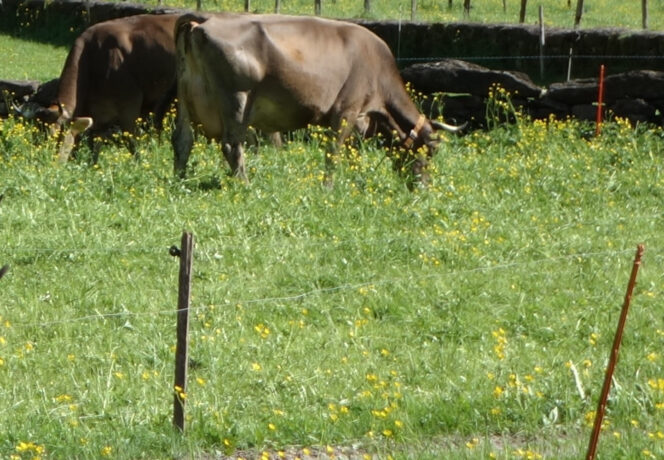
Archive
178 posts

If we systematically reduce inefficiencies in the food system—such as the heavy use of cropland-based feed, concentrate feed for cattle, and avoidable food waste—we can achieve much higher self-sufficiency while lowering environmental impacts.
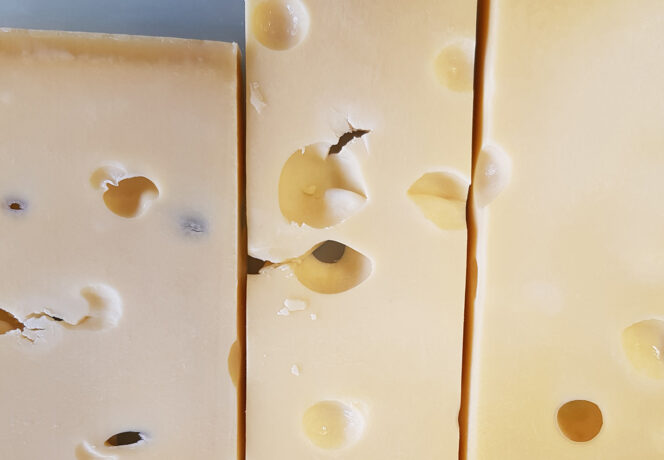
A New Bacterial Species Identified as the Cause of the ‘Putrificus’ Cheese Defect
Agroscope and its Italian counterpart CREA (Consiglio per la ricerca in agricoltura e l’analisi dell’economia agraria) have described the new bacterial species Clostridium caseinilyticum sp. nov., isolated from cheese with the ‘putrificus’ quality defect and from silage. The study sheds light on potential causes and can contribute to the development of preventive measures.

Swiss Consumer Wine Preferences: Traditional vs. Fungus-Resistant Grape Varieties
Wines made from fungus-resistant grape varieties are meeting with a comparable success to those from traditional grape varieties. A Swiss study reveals several consumer profiles, highlighting the importance of custom-tailored marketing strategies.

Whey for Food and Higher-Quality Feed that also meets Kosher/Halal Standards
Together with the cheese- and whey-processing sector and the foodward Foundation, Agroscope investigated how whey can be used in food and higher-quality feed. Vegetarian, kosher- and halal-compliant whey expands potential applications in the food sector.

How Healthy are Milk Alternatives? Analysis and Scope for Improvement
An Agroscope study has analysed the nutritional quality of 66 milk alternatives from Swiss supermarkets. The researchers also considered how the nutritional profile of milk alternatives could be improved.

The Salt Dilemma with Emmentaler Cheese
Emmentaler PDO has a low-to-very-low salt content compared to other varieties of cheese. Agroscope researchers show how this came about, what sort of effects this has on sensory quality, and what can be done about this.

Milk MIR Spectra and Machine Learning to Verify Herbage Proportion in Dairy Herd Diets
How to verify grassland-based feeding? An approach based on machine learning and milk mid-infrared (MIR) spectra acquired from routine milk quality testing may be the answer.

A1/A2 Genetic Background of Cows, But Not Their Horn Status, Influences Milk Protein Digestion
The influence of horn status and the genetic variant of the (A1/A2) β-Casein milk protein on milk quality and digestion is the subject of much debate. This study shows that the milk of cows with a genetic difference in β-Casein is digested slightly differently in the human stomach, but that horn status has no effect in this regard.

Quality of Swiss Beef Confirmed by 2023 Survey
The results of the 2023 beef quality survey have been released. They show that the quality of Swiss meat overall is highly satisfactory, in terms of nutrition as well as technological and sensorial aspects.

The Highly Diverse and Nutrient-Rich Inner Life of Sourdough Bread
The microbial composition of the sourdough culture defines the character of the bread baked from it. A sourdough can increase the health-promoting characteristics of bread when combined with specific types of flour and suitable processing parameters.

Information Framing Makes Visually Suboptimal Potatoes more Appealing
Large quantities of potatoes are rejected due to visual defects. For this reason, Agroscope researchers investigated how consumers can be motivated to purchase visually suboptimal potatoes.

Paratuberculosis in Cattle: International Evolution and Situation in Switzerland
A current overview of paratuberculosis describes this chronic disease of cattle, shows how it is being controlled internationally and in Switzerland, and explains why this is important.

What Effect Does Sorghum-based Feeding Have on Cheese Quality?
Climate change is compelling producers to find alternatives to the usual fodders. Sorghum is one alternative. When used in dairy-cattle feed, how does it affect the quality of hard cheeses?

Plant-Based Alternatives – an Analysis of the Last Ten Years
The study examines the discourse in the media on plant-based alternatives in Switzerland to gain insights into current trends. Instead of questioning consumers directly, the researchers analysed the media discourse which shapes and reflects consumer perceptions.
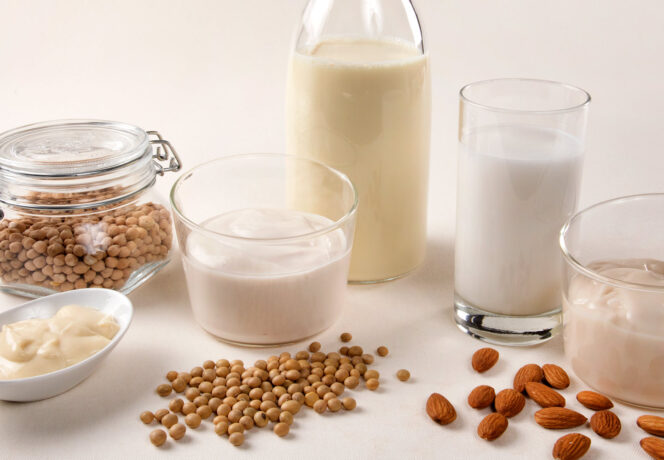
How are Plant-Based Alternatives to Dairy Products Perceived and Who Consumes Them?
The range of plant-based alternatives to milk continues to rise. Agroscope and the SMP (Swiss Milk Producers) conducted an online survey to find out what products are being consumed and how they are perceived.
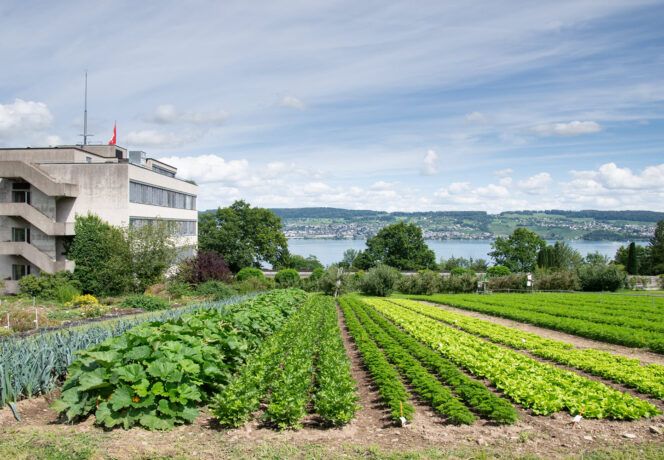
Co-formulants in Plant Protection Products and their Residues in Food
Plant protection products contain active substances and co-formulants. Agroscope studied the residues of co-formulants on treated plants for the first time, thereby furnishing the basis for assessing risks posed to consumers.
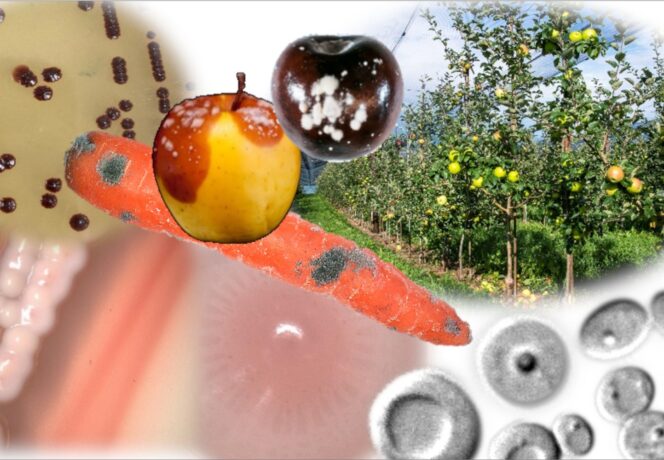
The Many Uses of the ‘Most Beautiful’ Yeast, Metschikowia pulcherrima
Metschnikowia pulcherrima is a naturally occurring yeast with applications in agriculture, the food industry and biotechnology. Agroscope is investigating this yeast in particular with regard to biocontrol applications in plant protection.
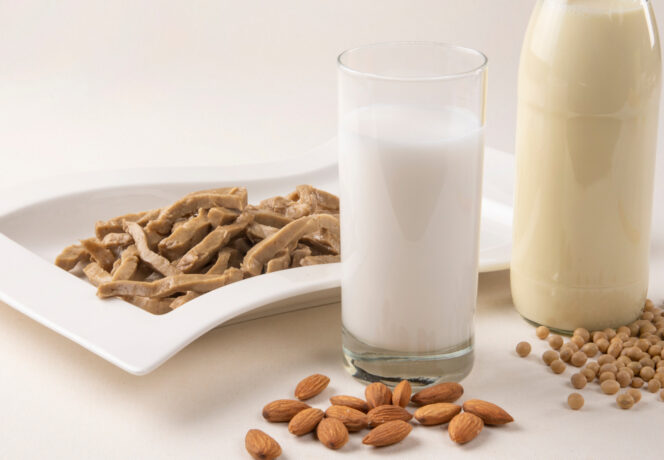
Plant-Based Drinks – an Alternative to Milk?
Soya-, cereal-, seed- or nut-based plant drinks are consumed increasingly frequently as milk substitutes. Agroscope researchers have studied the macro- and micronutrients in these drinks and have identified major differences between the plant drinks themselves as well as in comparison with milk.

Cheese Varieties: Volatile Carboxylic Acids Contribute to their Unmistakeable Character
Cheese varieties from Switzerland are characterised according to various criteria. Agroscope analysed the free volatile carboxylic acids in ten cheese varieties and demonstrated that the latter are suitable for characterisation and differentiation.

Variability and Clonal Selection of Muscats in the Valais
Safeguarding the clonal diversity of Muscats in the Valais has enabled the characterisation of 42 Muscat à petits grains and 36 Moscato Giallo clones. The characteristics of the two are quite distinct, particularly their aromatic potential. The best clones will be included in the Swiss certification scheme.
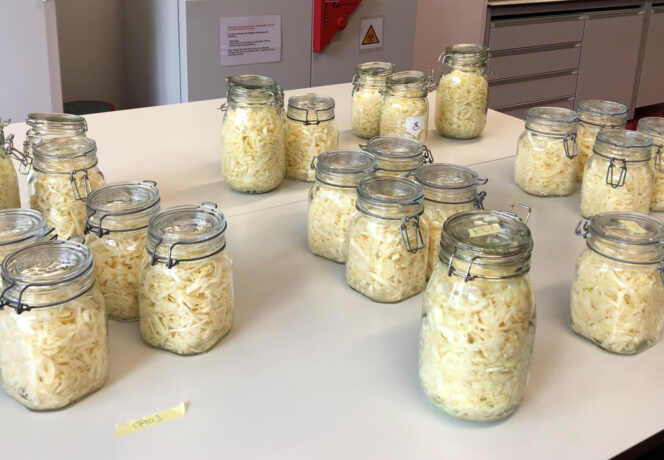
The potential of fermented foods for a healthy and sustainable diet
Bread, sauerkraut, cheese, wine, beer, yoghurt, chocolate, coffee, kimchi, tempeh, soy sauce, miso, etc. – all these are fermented foods and are part of our daily diet. What exactly are fermented foods and what role do they play in a healthy and sustainable diet?
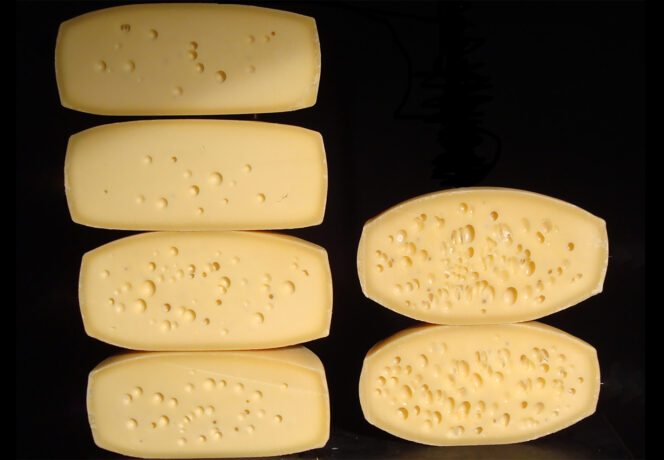
How Does Fat Content Affect Eye Formation in Cheese?
A quarter fat Appenzeller cheese usually has significantly more holes (‘eyes’) than a full fat Appenzeller. Is this really due to the fat content? Agroscope researchers looked into this issue.

Microbiological Safety of Raw-Milk Yoghurt
The consumption of raw-milk products is considered to be healthy, but is not entirely risk-free due to the possible presence of pathogenic bacteria. Agroscope and BFH-HAFL investigated the microbiological safety of raw-milk yoghurt and showed that this is protected in several respects by fermentation.

Do Different Generations Eat Differently?
Agroscope researchers analysed the dietary trends of the different generations in Switzerland. The findings help with the preparation of more-accurate dietary forecasts.

Plant-based Beverages and Cow’s Milk: a Comparison of Physico-chemical Properties
The number of plant-based beverages on supermarket shelves is constantly increasing. The physicochemical properties of these beverages, such as their colour or foamability, vary according to the plant they are made from, and determine their use as an alternative to milk.
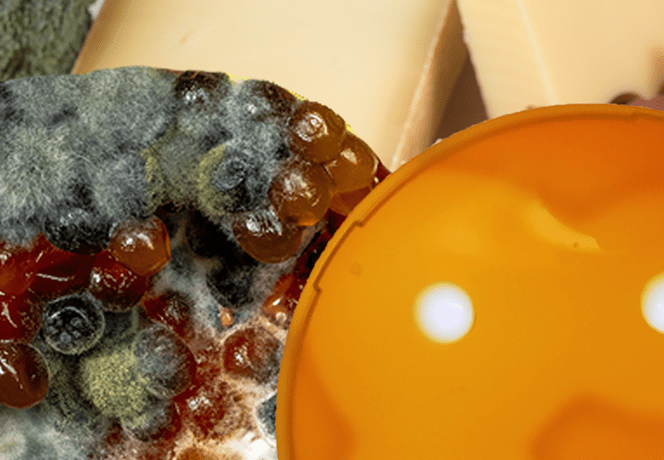
Biopreservation – the Forgotten Role of Fermentation
Selected microorganisms extend the shelf-life of foods, thereby contributing to a reduction in food waste. In a study of the literature, Agroscope highlighted the important role of protective cultures and fermentation.
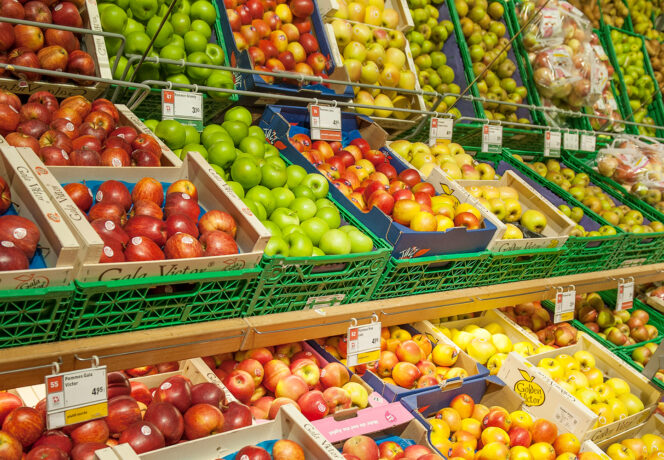
What Measures Promote a Sustainable Diet?
It’s not easy to change eating habits. In a study of the literature, Agroscope investigated which policy measures favour a sustainable diet. Market-oriented tools and bans prove effective, but are fairly unpopular.

How Do Sound Waves Affect Plants and Microorganisms?
Plants and microorganisms can perceive and respond to sound waves. In a review of the literature, Agroscope analysed various publications on this topic. The studies show that sound can lead to positive effects on physiology in the form of improved growth, development and disease resistance.

Less Meat, Less Waste ‒ War and Crises Are a Call for Change
The war in Ukraine, dry spells and droughts followed by heavy rainfall and flooding are major challenges for our food systems. But the problems that they bring to light are nothing new – and solutions are already to hand.

The Bacterium Morganella morganii Forms Biogenic Amines in Raclette Cheeses
Biogenic amines in foods represent a health risk. Researchers from Agroscope and INRAE investigated the formation of these undesirable substances in raclette cheeses by the bacterium Morganella morganii.